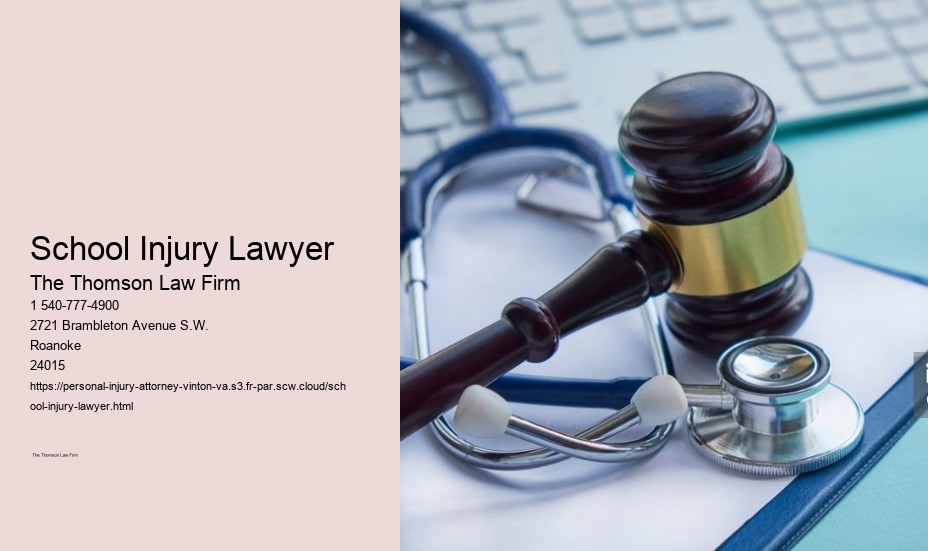

Introduction
Accidents are unexpected and can leave you feeling shaken and unsure of what to do next. Whether it's a minor fender bender or a more serious collision, knowing the right steps to take can make a significant difference in protecting your health, rights, and financial future. In this article, we provide advice from a Vinton, VA personal injury attorney to help you navigate this challenging time.
Immediate Steps to Take at the Accident Scene
The moments immediately following an accident are crucial. Read about the best School Injury Lawyer in Vinton, VA. Here's what you need to do right away.
Ensure Safety and Check for Injuries
Your first priority should be to ensure your safety and the safety of others. Check yourself and your passengers for injuries. If anyone is hurt, call for medical assistance immediately. If it's safe, move your vehicle out of traffic to prevent further accidents.
Call 911 and Report the Accident
No matter how minor the accident may seem, it's important to call 911 and report it. The police will document the scene and create an official report, which can be crucial for insurance claims and legal proceedings.
Exchange Information with Other Parties
Collect names, contact information, driver's license numbers, license plate numbers, and insurance details from all parties involved. If there are witnesses, get their contact information as well.
Gather Evidence
Use your phone to take pictures of the accident scene, including vehicle damage, road conditions, and any visible injuries. This evidence can be invaluable later.
Do Not Admit Fault
Avoid discussing fault at the scene. Statements made in the heat of the moment can be used against you later. Simply exchange information and cooperate with the authorities.
Steps to Take Shortly After the Accident
Once you've left the scene, there are several important steps to follow to protect your interests.
Seek Medical Attention
Even if you feel fine, it's important to see a doctor. Some injuries may not be immediately apparent. Prompt medical attention ensures your injuries are documented and treated.
Notify Your Insurance Company
Report the accident to your insurance company as soon as possible. Provide them with all the details and cooperate fully with their investigation.
Document Your Injuries and Damages
Keep detailed records of your injuries, medical treatments, and any other accident-related expenses. This documentation is essential for any insurance claims or legal action.
Keep Track of Expenses
Maintain a log of all expenses related to the accident, including medical bills, vehicle repairs, and any lost wages. This will help you in seeking full compensation.
Understanding Your Legal Rights
Knowing your rights is crucial to ensuring you receive fair treatment and compensation.
Consult with a Personal Injury Attorney
A personal injury attorney can provide valuable guidance on your case.
Understanding Compensation
Compensation can cover medical bills, property damage, lost wages, and pain and suffering. Your attorney can help you determine what you may be entitled to based on the specifics of your case.
The Role of a Personal Injury Attorney
An attorney will handle communication with insurance companies, gather evidence, and represent you in court if necessary. Their expertise can significantly impact the outcome of your case.
Common Mistakes to Avoid After an Accident
Avoiding these common pitfalls can strengthen your case and improve your chances of a favorable outcome.
Settling Too Quickly
Insurance companies may offer quick settlements that are far less than what you deserve. Consult with your attorney before accepting any offers.
Providing a Recorded Statement to Insurance Adjusters
You are not obligated to provide a recorded statement to the other party's insurance company. Consult your attorney before making any statements.
Neglecting Follow-Up Medical Care
Failing to follow up on medical treatment can not only harm your health but also weaken your case. Ensure you attend all medical appointments and follow your doctor's advice.
Conclusion
Dealing with the aftermath of an accident can be stressful and confusing. By following these steps and seeking the guidance of a knowledgeable personal injury attorney, you can protect your rights and improve your chances of receiving fair compensation. Remember, taking the right actions immediately after an accident can make a significant difference in your recovery and legal outcome.
Why You Need a Personal Injury Attorney After a Slip and Fall Accident
Introduction
Slip and fall accidents can happen to anyone, anywhere, and at any time. Whether it's a wet floor in a grocery store or an uneven sidewalk, these accidents can lead to serious injuries. When such unfortunate events occur, understanding your rights and seeking proper legal assistance is crucial. This is where a personal injury attorney comes into play. But why exactly do you need a personal injury attorney after a slip and fall accident? Let's dive in and explore.
Understanding Slip and Fall Accidents
Slip and fall accidents are a subset of personal injury cases where an individual slips, trips, or falls due to a hazardous condition on someone else's property. Common causes include wet floors, icy sidewalks, uneven surfaces, poor lighting, and obstacles in walkways. These accidents can result in various injuries, from minor bruises to severe fractures and head injuries.
According to the National Floor Safety Institute, falls account for over 8 million hospital emergency room visits, representing the leading cause of visits (21.3%). These statistics highlight the prevalence and seriousness of slip and fall accidents.
Immediate Steps to Take After a Slip and Fall Accident
The moments following a slip and fall accident are crucial. Here's what you should do:
Ensure Safety and Seek Medical Attention:
Your health is the top priority. If you're injured, seek medical help immediately. Some injuries may not be apparent right away, so a medical evaluation is essential.
Report the Accident:
Notify the property owner or manager about the incident. Ensure that an accident report is filed, and obtain a copy for your records.
Document Everything:
Take photos of the accident scene, your injuries, and any hazardous conditions that caused the fall. Collect contact information from any witnesses.
The Role of a Personal Injury Attorney
A personal injury attorney specializes in cases where individuals have been injured due to someone else's negligence. Their primary role is to advocate for the injured party, ensuring they receive the compensation they deserve. They handle all legal aspects of the case, allowing the injured person to focus on recovery.
Why You Need a Personal Injury Attorney
Knowledge of Personal Injury Law: Personal injury attorneys understand the complexities of personal injury law and how it applies to slip and fall cases. They know the statutes of limitations, legal procedures, and how to build a strong case.
Experience with Insurance Companies: Dealing with insurance companies can be daunting. Vinton Legal Services Insurance adjusters aim to minimize payouts, often offering settlements far below what victims deserve. An attorney negotiates with these companies, ensuring fair compensation.
Ability to Prove Liability: Proving that the property owner was negligent and that their negligence caused your injury can be challenging. A skilled attorney gathers evidence, consults experts, and builds a compelling case to establish liability.
Maximizing Compensation: Personal injury attorneys work to maximize the compensation you receive. This includes covering medical expenses, lost wages, pain and suffering, and other damages related to the accident.
Common Challenges in Slip and Fall Cases
Slip and fall cases come with unique challenges:
Proving Negligence: Establishing that the property owner was negligent and that their negligence led to your accident can be difficult. It requires thorough investigation and evidence.
Dealing with Insurance Companies: Insurance companies may use tactics to reduce or deny claims. Having an attorney on your side ensures that you are treated fairly.
Gathering Evidence: Collecting sufficient evidence to support your claim is essential. This includes photos, witness statements, medical records, and expert testimony.
How a Personal Injury Attorney Can Help
A personal injury attorney assists in various ways:
Investigating the Accident: Attorneys conduct thorough investigations to uncover all facts and identify liable parties.
Collecting Evidence: They gather and preserve crucial evidence that supports your claim.
Negotiating Settlements: Attorneys negotiate with insurance companies and opposing parties to reach a fair settlement. If necessary, they are prepared to take the case to trial.
The Legal Process in Slip and Fall Cases
Understanding the legal process can demystify the steps involved in pursuing a slip and fall claim:

Filing a Claim: The process begins with filing a claim against the liable party. Your attorney will prepare and submit all necessary paperwork.
Discovery Phase: Both parties exchange information and evidence related to the case. This phase involves depositions, interrogatories, and document requests.
Settlement Negotiations: Many cases are settled before going to trial. Attorneys negotiate on your behalf to reach a favorable settlement.
Trial Process: If a settlement cannot be reached, the case goes to trial. Your attorney will present your case in court, aiming to secure a verdict in your favor.
Qualities to Look for in a Personal Injury Attorney
When choosing a personal injury attorney, consider the following qualities:
Experience and Track Record: Look for an attorney with a proven track record in handling slip and fall cases.
Communication Skills: Effective communication is key. Your attorney should keep you informed and be accessible to answer your questions.
Resources and Support: A well-resourced attorney can leverage expert witnesses, medical professionals, and investigative teams to strengthen your case.
Conclusion
Navigating the aftermath of a slip and fall accident can be overwhelming. A personal injury attorney not only provides the legal expertise needed but also offers peace of mind during a challenging time. By understanding your rights and having a dedicated professional on your side, you can focus on healing while your attorney works to secure the compensation you deserve. If you’ve experienced a slip and fall accident, don’t hesitate—seek the help of a qualified personal injury attorney today.
Navigating Medical Malpractice: Insights from a Personal Injury Attorney
When it comes to medical care, we place immense trust in healthcare professionals. However, sometimes things go wrong, and the consequences can be devastating. Navigating the complexities of medical malpractice can be overwhelming, but with the insights from a personal injury attorney, you can better understand your rights and the steps to take. This article will delve into the nuances of medical malpractice, the role of a personal injury attorney, and provide practical advice if you suspect malpractice.
Understanding Medical Malpractice
Medical malpractice occurs when a healthcare professional deviates from the accepted standard of care, resulting in injury or harm to the patient. This can happen in various settings, including hospitals, clinics, and private practices. The scope of medical malpractice is broad, encompassing a range of errors and negligent actions.
Common Types of Medical Malpractice
Misdiagnosis
Misdiagnosis is one of the most common forms of medical malpractice. Law Office It occurs when a doctor incorrectly diagnoses a patient, leading to incorrect or delayed treatment. This can cause significant harm, especially if the actual condition worsens without proper treatment.
Surgical Errors
Surgical errors are alarming and can include wrong-site surgery, accidental injury to organs, or leaving surgical instruments inside the body. These mistakes can have severe, life-threatening consequences.
Medication Mistakes
Medication errors involve prescribing the wrong medication, incorrect dosages, or failing to check for adverse drug interactions. Such mistakes can lead to serious health complications or even death.
Legal Framework Surrounding Medical Malpractice
Medical Malpractice Laws
Each state has its own set of medical malpractice laws that dictate how cases are handled. These laws cover everything from the definition of malpractice to the procedures for filing a lawsuit. Understanding these laws is crucial for any potential plaintiff.
Statute of Limitations
The statute of limitations refers to the time frame within which a medical malpractice claim must be filed. This period varies by state, and missing this deadline can prevent you from pursuing legal action. It’s essential to act promptly if you suspect malpractice.
Proving Negligence
To win a medical malpractice case, you must prove that the healthcare provider was negligent. This involves showing that the provider’s actions fell below the standard of care and directly caused your injury. Evidence, expert testimonies, and thorough documentation are vital in establishing negligence.
Role of a Personal Injury Attorney
Initial Consultation and Case Evaluation
A personal injury attorney will start by evaluating your case during an initial consultation. They will review your medical records, listen to your account of the events, and determine whether you have a viable malpractice claim.
Gathering Evidence
Once the attorney takes your case, they will begin gathering evidence. This includes medical records, witness statements, and any other relevant documentation. The goal is to build a strong case that clearly demonstrates the healthcare provider’s negligence.
Expert Witnesses
Expert witnesses play a crucial role in medical malpractice cases. These are medical professionals who can testify about the standard of care and how the defendant’s actions deviated from it. Their testimony can significantly impact the outcome of your case.
Steps to Take if You Suspect Medical Malpractice
Document Everything
If you suspect medical malpractice, start by documenting everything related to your medical treatment. This includes keeping detailed notes of your symptoms, treatments, and interactions with healthcare providers.
Seek a Second Opinion
Getting a second opinion from another healthcare professional can provide valuable insight into whether malpractice occurred. It can also help in identifying the correct diagnosis and treatment plan.
Contacting an Attorney
Reach out to a personal injury attorney as soon as possible. They can guide you through the legal process, help you understand your rights, and work on building a strong case.
Challenges in Medical Malpractice Cases
Complexity of Medical Evidence
Medical malpractice cases often involve complex medical evidence that can be challenging for non-medical professionals to understand.
High Cost of Litigation
Medical malpractice litigation can be expensive due to the need for expert witnesses, extensive documentation, and legal fees. Many attorneys work on a contingency basis, meaning they only get paid if you win your case, but the costs can still be a barrier for some plaintiffs.
Emotional Toll on Plaintiffs


Pursuing a medical malpractice case can be emotionally draining. Reliving traumatic experiences and dealing with the slow pace of legal proceedings can take a toll on plaintiffs. Support from family, friends, and mental health professionals can be crucial during this time.
Real-Life Cases and Their Outcomes
Case Study 1: Misdiagnosis
In this case, a patient was misdiagnosed with a minor ailment when they actually had a serious condition. The delayed diagnosis led to severe complications. The personal injury attorney successfully proved negligence, resulting in a significant settlement for the patient.
Case Study 2: Surgical Error
Another case involved a surgical error where the surgeon operated on the wrong body part. The patient suffered considerable harm, requiring additional surgeries and extended recovery time. The attorney was able to secure compensation for the patient's pain, suffering, and medical expenses.
Conclusion
Navigating the intricacies of medical malpractice is daunting, but understanding your rights and the legal processes involved can empower you to seek justice. Accident Lawyer A personal injury attorney plays a vital role in this journey, helping you build a strong case and fight for the compensation you deserve. If you suspect that you or a loved one has been a victim of medical malpractice, don’t hesitate to take action. Document everything, seek a second opinion, and consult with an experienced attorney to explore your options. The path may be challenging, but with the right support and guidance, you can navigate through it.
The Importance of Hiring a Personal Injury Attorney for Workplace Injuries
Introduction
Workplace injuries are unfortunately common, affecting millions of workers annually. Whether it’s a minor slip or a major accident, these incidents can have significant physical, emotional, and financial repercussions.
Understanding Workplace Injuries
Common Types of Workplace Injuries
The most common workplace injuries include slips and falls, machinery accidents, repetitive strain injuries, and exposure to hazardous substances. Each type requires specific medical attention and legal considerations.
Statistics on Workplace Injuries
According to the Bureau of Labor Statistics, over 2.8 million nonfatal workplace injuries and illnesses were reported in the private sector in recent years. This statistic underscores the prevalence of these incidents and the importance of legal representation.
Why You Need a Personal Injury Attorney
When you’re injured at work, hiring a personal injury attorney can make a world of difference. They offer expertise, support, and guidance through a challenging time.
Expertise in Workplace Injury Laws
Personal injury attorneys are well-versed in the laws governing workplace injuries. They understand the nuances of workers' compensation, employer liability, and third-party claims, ensuring your case is handled with expertise.
Navigating the Legal Process
The legal process following a workplace injury can be complex and overwhelming. An experienced attorney helps you navigate the paperwork, deadlines, and legal requirements efficiently.
Maximizing Compensation
One of the primary roles of a personal injury attorney is to ensure you receive the maximum compensation possible. This includes medical expenses, lost wages, and compensation for pain and suffering.
The Role of a Personal Injury Attorney
Personal injury attorneys play a crucial role in protecting your rights and interests following a workplace injury. Their involvement spans from the initial consultation to potential court representation.
Initial Consultation and Case Evaluation
The first step in the process is an initial consultation where the attorney evaluates the merits of your case, discusses potential outcomes, and outlines the next steps.
Investigation and Evidence Gathering
Attorneys conduct thorough investigations, gathering evidence such as medical records, witness statements, and workplace reports to build a strong case.
Negotiating with Insurance Companies
Insurance companies often aim to minimize payouts. A skilled attorney negotiates on your behalf, ensuring fair and adequate compensation for your injuries.
Representing You in Court
If negotiations fail, your attorney will represent you in court, presenting your case effectively to secure a favorable verdict.
How to Choose the Right Personal Injury Attorney
Choosing the right attorney is crucial for the success of your case. Here are some key factors to consider.
Experience and Track Record
Look for an attorney with a proven track record in handling workplace injury cases. Experience often translates to better outcomes.
Client Testimonials and Reviews
Client testimonials and online reviews provide insight into the attorney’s reputation and the quality of their service.
Transparent Fee Structure
Ensure the attorney offers a clear and transparent fee structure, ideally working on a contingency basis where they only get paid if you win.
Personal Rapport and Communication
A good attorney-client relationship is built on trust and communication. Choose someone you feel comfortable with and who communicates clearly.
Conclusion
Workplace injuries can be life-altering, but hiring a personal injury attorney ensures you have the support and expertise needed to navigate the legal landscape. From securing compensation to providing peace of mind, an attorney is an invaluable ally in your recovery journey.
What to Expect During a Personal Injury Lawsuit
Introduction
So, you’ve found yourself in the unfortunate situation of dealing with a personal injury lawsuit. Whether it’s from a car accident, a slip, and fall, or even medical malpractice, the process can be daunting. But don’t worry, I’m here to guide you through what to expect during a personal injury lawsuit.

A personal injury attorney is a legal professional who provides representation to individuals who have been injured physically or psychologically due to the negligence or wrongdoing of another party. These attorneys specialize in tort law, which covers civil wrongs and damages.
Yes, hiring a personal injury attorney is often worth it. An attorney's expertise can lead to a higher settlement than you might achieve on your own. They handle the legalities, negotiate with insurance companies, and ensure your rights are protected throughout the process.
Yes, personal injury attorneys at Thomson Law Firm handle medical malpractice cases. If you have been harmed due to a healthcare provider's negligence, we can help you pursue a claim for compensation.
Communication frequency can vary, but a good personal injury attorney should provide regular updates on your case's progress. At Thomson Law Firm, we believe in keeping our clients informed and are always available to answer questions and address concerns.
To find a good personal injury attorney in Vinton, VA, seek recommendations from friends, family, or online reviews. Research attorneys' backgrounds, check their credentials, and schedule consultations to discuss your case and gauge their suitability for your needs.